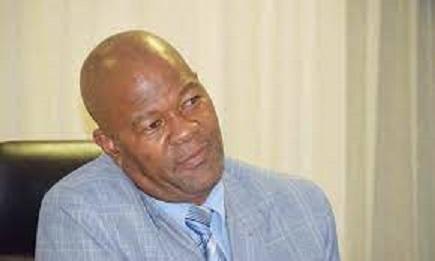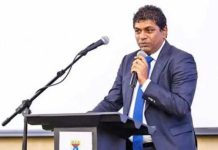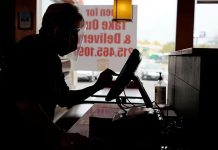Africa-Press – Lesotho. THABO Sophonea’s story is one of triumph over immense adversities. The odds appeared to have been staked against him, right from birth. His father died when he was 10. He has a faint recollection of the old man whom he hardly knew.
Sophonea was raised by a single mother in Thaba-Bosiu, with his elder brothers who were now working in the gold mines in South Africa, chipping in to support him from time to time.
It was a Spartan lifestyle characterised by deprivation. On some lucky days, Sophonea would attend classes, taking turns with his siblings to look after the family’s livestock.
Such “start-stop” attendance in class was never ideal; but that was his reality and all that he knew. It was no surprise that young Sophonea was asked to repeat Standard One after he performed dismally in end-of-year exams.
Despite showing sparks of brightness early on in school, Sophonea never had a strong support structure to prop him up. His story is that of a self-made individual with a keen desire to succeed and a clear sense of what needed to be done to achieve what he wanted.
When Sophonea finished Standard Seven, he moved in with his brother who was a police officer in Maseru. One of his brothers who was working in the mines in South Africa persuaded him to join him in mines.
He refused. “I knew that if I go to the mines I would never achieve my intention which was to go to school. I also refused to join the police. I knew that education was best step forward,” he says. From Standard Seven, Sophonea jumped into Form C at Zenon Secondary School, thanks to his exceptional academic prowess.
While other children were enrolled in formal day schools, Sophonea did not have that luxury – he enrolled at a night school at Sefika High School, while he got a job at the Bureau of Statistics working as a field officer in Berea district.
Every evening during the week, Sophonea would travel to Maseru to attend night classes at Sefika. At the end of the year, Sophonea excelled but could not proceed with his studies.
He passed his Cambridge Overseas School Certificate (COSC) examinations and enrolled to study for a Certificate in Statistics at the National University of Lesotho (NUL) in 1995 which he passed with a distinction.
Sophonea was exempted from starting in first year and was enrolled in third year for a double major for a Bachelor of Statistics and Economics degree.
He graduated from the NUL in 1999. A year later, he was off to the great and famous Makerere University in Uganda for his MSc in Statistics. This was a stunning transformation for a man who had always struggled to find a way through life’s most difficult challenges.
But here he was, rubbing shoulders with some of the sharpest brains on the African continent. “You can imagine how I felt, from being a mere field assistant and now I am at Makerere.
It was a dream come true,” he says. But beyond the academic training he received, Sophonea picked one important lesson in Uganda. While they would go out and enjoy themselves in bars after lectures, he noticed that most of his lecturers were running side-businesses, selling something.
“They told me that they don’t focus on one job, a man must make sure that he sells something,” he says. It was an important lesson that stayed with him long after he came back home.
And so while he was employed at the Bureau of Statistics, Sophonea began setting up some shops in his village. He also taught part-time at the university in Roma.
“I would buy stuff during lunch hour and rush to Roma to conduct evening lectures before rushing back to the shop to offload stuff,” he says.
In 2015 Sophonea took early retirement and went into politics full-time, winning the Thaba-Bosiu constituency for his All Basotho Convention (ABC) party in the 2017 snap elections.
Last year, Sophonea was appointed finance minister, a surprising appointment for a man who had always stayed in the shadows. In fact, Sophonea is not your normal politician.
He is at pains to portray himself as a “commoner” – a man of the people. “I don’t feel like a minister,” he says with a sigh. “The way I grew up, hae! The experiences I went through, I always want to be with the people.
I never dreamt that I would one day be a minister. ” He says he lost sleep the night he was informed he was going to be sworn in as Minister of Finance, petrified by the sheer burden of expectation.
“Instead of being excited, I was afraid and frustrated. I knew this was going to be a very big challenge,” he says. Sophonea says he asked Prime Minister Moeketsi Majoro why he had entrusted him with such a heavy responsibility of managing the national purse.
“Why me? But then he told me that he wanted someone at Finance who knows figures, someone who doesn’t have a fear of numbers.
Despite being entrusted with the key task of managing the national purse, Sophonea remains a very earthy fellow who is fully aware of his limitations as a person and a politician.
“I am a Mathematician by training and even in politics, I don’t speak much. I am comfortable doing mathematical analysis but I dread presentations,” he says before bursting into laughter.
He cites the budget presentation last year where he says he almost froze as he fumbled through the 45-page budget speech. That speech was a real baptism of fire, he says.
He says he only had a few weeks to prepare the budget after his appointment as minister. Sophonea says he is at the Ministry of Finance to make a difference, vowing to act decisively, if need be, to achieve his goal.
The culture of thievery was rampant in the ministry when he arrived, citing the looting of the Old Age Pension fund. “We decided to clean up the ghost pensioners who were in the system and there was a lot of resistance,” he says.
“They (corrupt civil servants) decided to frustrate the system. They went on radio stations and attacked me. But I said I cannot stop doing this, which was the right thing to do. We are almost through with that exercise now. ”
Sophonea says they have successfully weeded out over 10 000 ghost beneficiaries from the system who were corruptly getting old age pensions. There were at least 60 deceased people at each pay point, he says.
“I told myself that I was not going back on this issue until this matter was resolved.
” Sophonea speaks candidly of what he says is the rotten politics in Lesotho which has held back development programmes. He says when colleagues are doing great things for the country, “we are always looking for the negatives”.
He says when the Basutoland Congress Party (BCP) won elections in 1993, it began privatising state entities to spite the BNP which had come up with such progressive programmes.
The new government sold Lesotho Airways, Lesotho Flour Mills and the Agric Bank, he said. “It was a mistake to sell; the motive was to spite the BNP. Their thinking was that we must sell everything, and start our own not knowing that it was going to be very difficult,” he says.
Such policies set this country a few decades back and we are still paying for such wayward policies, Sophonea says. “You can’t just destroy something good just because it was done by your political adversaries.
That is a serious problem. They even changed the national flag. ” We also began politicising the civil service, employing our own party functionaries instead of competent civil servants.
The result was a collapse in quality service within the government, he says. “The principal secretary’s office is key; he is the one on the ground to make things happen.
But now he is a political appointee. We take people who failed to win a constituency to run ministries, which has been disastrous. ” Because we have politicised the civil service, it is now very difficult to control staff, he said.
“We have politicians in the system who can decide to sabotage you,” he says. To instill values of patriotism, Sophonea wants to see some kind of national service programme re-introduced in Lesotho.
“We must instill patriotism in Basotho and teach them that you can’t steal from your own people and your own government.
We need to teach them values of honesty and hard work. ” As finance minister, Sophonea is painfully aware of the immense economic and social challenges facing Lesotho.
Thankfully, he also appears to know what needs to be done to fix the country. He says he wants to see the private sector acting as the engine of economic growth in Lesotho.
“Our plan was to strengthen the private sector,” he says.
“It is the engine of growth, our role is to build policies to facilitate that growth, not to lead things.
He says they are pushing the build, operate and transfer (BOT) model which is quite complex and need serious expertise to deal with the country’s developmental challenges.
“We will need to invest in our own people,” he says. He says the Covid-19 pandemic has unfortunately wreaked their plans.
Sophonea says the bitter infighting in the ABC has stifled development and damaged the party’s electoral prospects. “For a whole year, we have been fighting for positions without serving our own people.
All we have concentrated on is how to defeat each other,” he says. Sophonea admits that this has left the party with a huge mountain to climb next year as it seeks to convince a tired electorate that it deserves a new five-year mandate to govern.
While the party did fairly well in the first year or two after it was swept into power in 2017, we are now at a stage when you do 99 good things and one bad one, it wipes out everything that was good, he says.
“We did not have a clear succession plan and that is why we ended up where we are.
A clear succession plan would have stopped so many conflicts which eventually saw the party split,” he says. “That issue (split) really frustrated us.
Professor Nqosa Mahao, who was elected the party’s deputy leader, has since packed his bags and left the ABC to form his own Basotho Action Party (BAP).
A number of senior officials have since moved out with him, knocking a big chunk off the party’s electoral base. It remains to be seen though how much of an impact the split will have on the ABC, come elections next year.
Political analysts however say the ABC would need to re-invent itself quickly as the darling of the masses if it is to retain power, a tall order with an election just less than 12 months away.
However, Sophonea says he still hopes the party will perform well in the coming general election. As finance minister, Sophonea occupies a very strategic ministry within the government.
So, does he see himself one day positioning himself for a strike at the country’s biggest job? “I am not interested; I am not hungry for that post,” he says, adding that he reluctantly joined into politics after being pushed by his own people in his Thaba-Bosiu constituency.
It would appear, Sophonea – the reluctant politician – might need a similar nudge again if he is to go for the position of Prime Minister if and when it becomes vacant.
For More News And Analysis About Lesotho Follow Africa-Press






